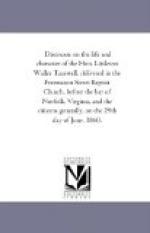and 7,500, and consisted of a large infusion of French
from the West India islands, Scotch and English in
considerable proportions, Irish, and New English.
There were some Dutch, Spanish, and Portuguese.
Our Norfolk born people, and the people from the neighboring
counties, formed the base—a pretty broad
base, but only a base. Everybody was busy.
Wirt, writing a year or two later to a friend, likened
the borough to a hive in which their was no drone.
The outward appearance of things was bad enough.
The houses on the wharves and in the business streets
were all of wood, and have since been swept away by
successive fires. There was not a paved street
within the bills of mortality. Immense pools
of mud and water were seen everywhere; and it was a
favorite amusement of the boys to watch the attempt
of a loaded dray to pass through those beds of muck.
There were three merchants at farthest, whose wealth,
on a most liberal estimate, might possibly average
$100,000, though they thought themselves worth a good
deal more. There was but one brick church, and
that was the present St. Paul’s, not, as we
now see it, with its tasteful interior, but a rude
brickkiln with an enormous cocked hat stuck upon it.
The people heard preaching in the upper rooms of warehouses,
in the court-house, or in some rickety concern knocked
up for the nonce. The clergy fared badly.
The rector of a large brick church, then rising, with
a wealthy congregation, received for his services
one hundred pounds, Virginia currency, which equal
three hundred and thirty-three dollars and thirty-three
cents of our money, and both pastor and people seemed
to be satisfied with the bargain. Small houses,
some of which may still be seen, straggled out along
Church street, to what is now called Fort Barbour,
though not so called till twelve years later.
There was hardly an elegant private residence in the
city. The bricks, of which the best houses were
built, were rough and roughly laid. The houses
had no conveniences, except here and there a closet.
They were, however, substantially built, and were
neatly finished within. They invariably had one
thing which is fast passing away. There was the
smoke-house in which every housekeeper cured his meat;
and there was the dairy; but how they could put the
dairy to its proper use I could never find out.
The people had cows, and the cows gave milk; but there
was no running water, and there was no ice. Long
years passed before ice was introduced. The gentlemen
of the bar were awake, and made out very well—much
better than the clergy. The very youngest of
the profession fed freely and voluptuously on the black
eyes and cracked crowns of Little Water street, with
an occasional haul from Exchange alley and the river
Styx. A set, rather older, ventured into the
expanse of Broadwater, and talked of the relations
of landlord and tenant, of master and apprentice,
and sometimes, in that belligerent neighborhood, of
husband and wife, and not unfrequently of the writ




